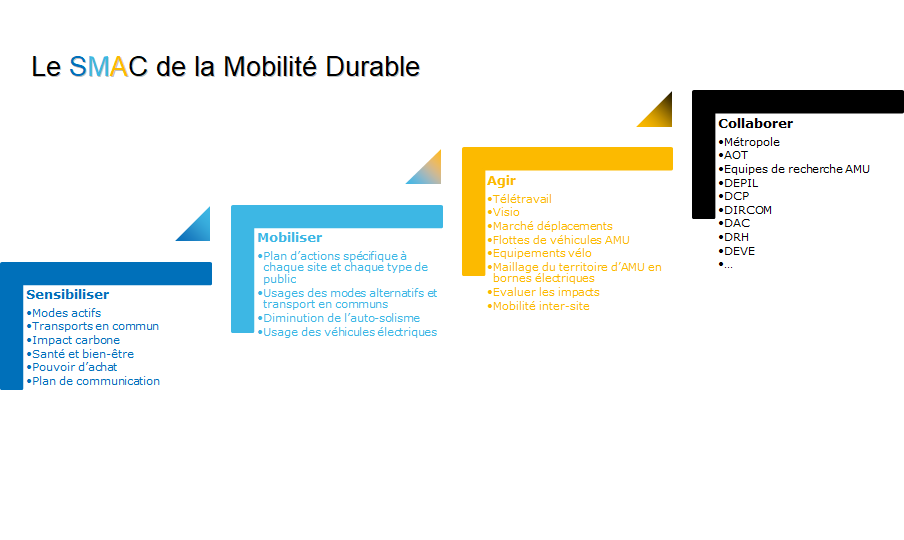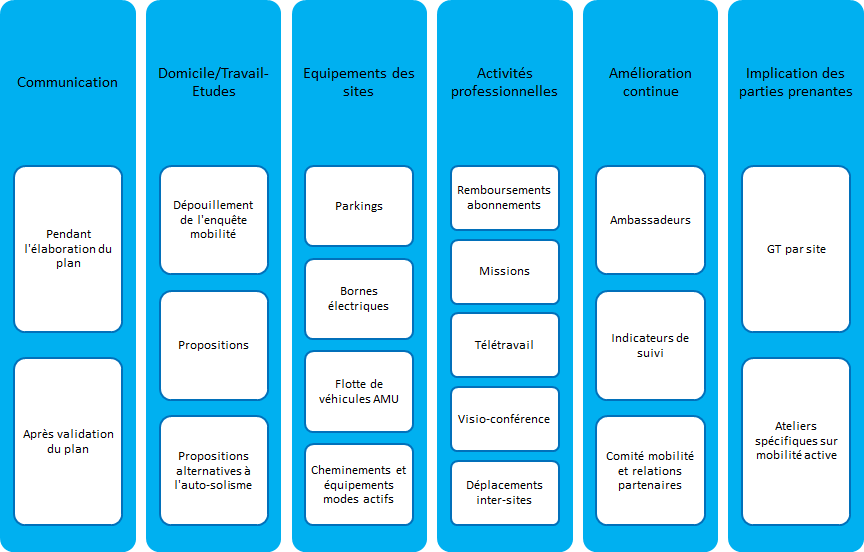
SMAC de la mobilité durable
Sensibiliser
- Modes actifs
- Transports en commun
- Impact carbone
- Santé et bien-être
- Pouvoir d’achat
- Plan de communication
Mobiliser
- Plan d’actions spécifique à chaque site et chaque type de public
- Usages des modes alternatifs et transport en communs
- Diminution de l’auto-solisme
- Usage des véhicules électriques
Agir
- Télétravail
- Visio
- Marché déplacements
- Flottes de véhicules AMU
- Equipements vélo
- Maillage du territoire d’AMU en bornes électriques
- Evaluer les impacts
- Mobilité inter-site
Collaborer
- Métropole
- AOT
- Equipes de recherche AMU
- DEPIL
- DCP
- DIRCOM
- DAC
- DRH
- DEVE
In order to respond to climate issues, to echo the BEGES of Aix-Marseille University (AMU), which showed that 63% of our greenhouse gas emissions are due to mobility, to change the issue of transport in our territory and its use, AMU has redeployed its entire policy of Sustainable Development and Social Responsibility (SD/RS) actions through the SMAC and the Sustainable Mobility Plan led by Mariane Domeizel, Vice-President of Sustainable Development for AMU, and implemented by the Sustainable Development Department.
The SMAC translates AMU's SD/RS policy strategy by expressing the projects carried out and the objectives to be achieved according to 4 action verbs: Raise awareness, Mobilise, Act and Collaborate.
The Sustainable Mobility Plan
The Sustainable Mobility Plan (PMD) is one of the projects that feeds the SMAC on the issue of travel in our community. It is a set of measures that aims to optimize and increase the efficiency of travel for staff and students of the university, to reduce pollution emissions and reduce road traffic.
To achieve this, the PMD aims to reduce the number of trips made by the AMU community, develop shared mobility, encourage active mobility, increase the use of public transport and equip the sites.
All these recommendations are the results of the mobility survey conducted within AMU in 2019.
The AMU mobility survey
This survey was sent by email to all staff and students, collecting nearly 6,200 responses, of which 5,025 were usable. All university sites were represented with good participation rates ranging from 4 to 28%. The results of this survey can thus be considered significant.
The results can be very different from one site to another. For example, the following can be noted:
- 30 to 80% of personal and student car drivers combined
- 15 to 35 km on average for a daily car journey. Sites with a very high rate of car-pooling have very few long distances, which proves that there is no correlation between these two variables
- 40-90% of users make inter-site trips
- The survey also made it possible to express the possible obstacles to a modal shift:
- Public transport: 35% insufficient frequency, 27% too long journeys, 25% insufficient range of hours
- Carpooling: 35% difficulty in finding suitable carpoolers, 20% no guarantee of travel if a carpooler withdraws, 15% no obstacle
- Cycling: 33% problems with distance, 31% unsafe routes, 25% lack of comfort in cycling
The LDC COPIL
Once the results were in, the PMD was launched. Because a Sustainable Mobility Plan cannot be efficient without the active participation of the stakeholders for whom it was developed, the COPIL, led by the VP of Sustainable Development, is made up of a variety of members of our community: sustainable development referents, AMU internal services and transport players in the area. It should also be noted that AMU is represented on the COPIL of AMP Métropole, thus making it possible to cross-reference the needs of users with the actions in terms of mobility proposed by the metropolis.
The COPIL has set up 5 working groups (see figure below): Activities, Continuous improvement, Equipment, Home/Work/Study, Subsidiarity and stakeholders/Communication and awareness).
The Subsidiarity and Stakeholders working group proposes actions to come and meet you on site, to hear your needs and to know your issues through the "SD Cafés". As the configuration and the transport offer are not identical from one university site to another, we need your testimonies to propose adapted solutions.

Sustainable Development Department
Campus Marseille centre - Site Saint Charles
3 place Victor Hugo - case n°28
13331 Marseille cedex 03
Email : dvpt-durable-contact@univ-amu.fr

